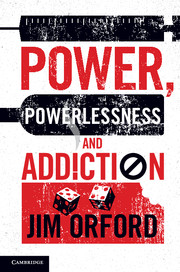Book contents
- Frontmatter
- Dedication
- Contents
- Preface
- Acknowledgements
- 1 Powerful connections
- 2 How addiction erodes free agency
- 3 Addiction subordinates the interests of family members and friends
- 4 Inequality in the power to resist addiction
- 5 Power and powerlessness in the addiction supply industries
- 6 Reasserting control and power in the process of change and treatment
- 7 Facing up to the power of addiction and those who benefit from it
- References
- Index
2 - How addiction erodes free agency
Published online by Cambridge University Press: 05 July 2013
- Frontmatter
- Dedication
- Contents
- Preface
- Acknowledgements
- 1 Powerful connections
- 2 How addiction erodes free agency
- 3 Addiction subordinates the interests of family members and friends
- 4 Inequality in the power to resist addiction
- 5 Power and powerlessness in the addiction supply industries
- 6 Reasserting control and power in the process of change and treatment
- 7 Facing up to the power of addiction and those who benefit from it
- References
- Index
Summary
Power and its distortion as the book's main theme
It is in this chapter that I want to begin to develop the idea central to the book: that addiction, with all its social connections, may be understood as a phenomenon associated with serious distortions of the relationships of power between people. That idea may, on first hearing, seem a mysterious one. The term ‘power’ is mostly familiar in the context of politics, social movements or matters military. But, of course, it is a term used much more widely than that and one that has a long history of usage in philosophy and the social sciences. Throughout the rest of the book I shall draw on ideas about power borrowed from a number of different disciplines. From political science comes the idea of the concentration of power and the question, hotly debated in the 1960s, of whether power (principally in the USA) was largely wielded by relatively small numbers of people – the elites – or whether society was more pluralistic and power more widely dispersed (Dahl 1961). Since then political and social theorists have shown us how complex the concept of power is (Clegg 1989; Lukes 2005). For one thing, power's scope is variable, some power-holders compared to others exercise power over far larger numbers of other people and/or over a greater number of domains of other people's lives (Wrong 1979). Power is sometimes viewed as legitimate, accepted as functional for the social group, thought of as serving collective interests, and often referred to using terms such as authority, leadership or expertise. But power can also be exercised coercively or manipulatively, more obviously serving the interests of the power-holder and contrary to the interests of the powerless.
- Type
- Chapter
- Information
- Power, Powerlessness and Addiction , pp. 35 - 68Publisher: Cambridge University PressPrint publication year: 2013



